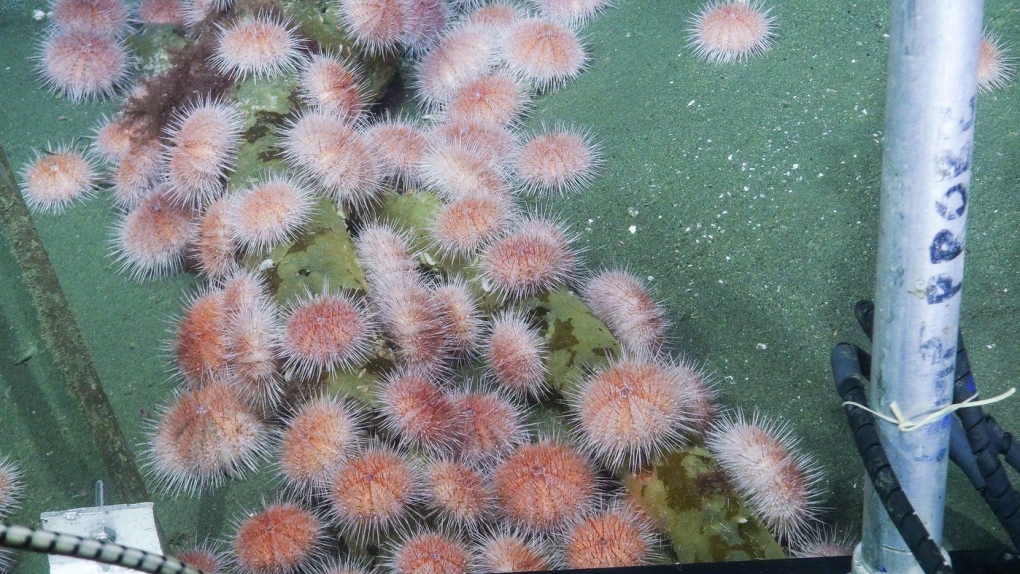B.C's pink sea urchins moving to shallower waters due to climate change
 Deepsea fragile pink sea urchin aggregating to feed on decaying seaweed at the Endeavour site during a 2016 expedition, is seen in this image provided February 7, 2023. Pink urchins like these are expanding their territory into shallower B.C. water. Researchers say the movement is a sign of how fast climate change is impacting life in the water. THE CANADIAN PRESS/HO-Ocean Networks Canada
Deepsea fragile pink sea urchin aggregating to feed on decaying seaweed at the Endeavour site during a 2016 expedition, is seen in this image provided February 7, 2023. Pink urchins like these are expanding their territory into shallower B.C. water. Researchers say the movement is a sign of how fast climate change is impacting life in the water. THE CANADIAN PRESS/HO-Ocean Networks Canada
Pink sea urchins off the coast of Vancouver Island are expanding into shallower waters, in what researchers say is an indication of how rapidly climate change is affecting ocean life.
Researchers at Memorial University, Ocean Networks Canada and the University of Victoria found the urchins, living as deep as 400 metres below, were expanding their populations into shallower water at an average rate of 3.5 metres per year as ocean warming reduces oxygen levels and food sources at lower depths.
The study's co-author, Rylan Command, said heat domes and heat waves are becoming more common, and understanding how the ocean responds to those changes can have a direct impact on people.
The movement of the pink urchins over time could, for example, upset the balance with other sea creatures, leading them to replace other species, such as red sea urchin harvested in fisheries, he said.
“It's almost like an indicator that things are changing rapidly and that matters for people, because that's going to affect us too,” he said.
Researchers looked at 14 years of data including before, during and after the marine heat wave known as “The Blob,” which persisted in the Pacific Ocean between 2013 to 2016.
They used data from both an Ocean Networks Canada observatory and the Federal Fisheries and Oceans trawl survey to collect information from about 400 metres deep, covering an area of 760-square kilometres.
“We were able to get a holistic picture of how everything is changing. I think that kind of data combination is really important and really useful,” Command said.
Study co-author Fabio De Leo, who's with Oceans Network Canada, said warming from The Blob destroyed much of the kelp the urchins eat, causing their populations to drop off dramatically.
“The kelp forests felt the marine heatwave pretty strongly. So, this essentially is one of the main food items for the pink urchin,” he said.
The researchers say the warmer-than-normal surface temperatures also disrupted the ocean process known as “upwelling,” when nutrient-rich water from lower depths cycles up to the surface, potentially affecting where the urchins find food.
The B.C. research matches similar work done in California in 2017, which found that pink urchins in that region were also seeking shallower waters.
De Leo said having data stretching over more than a decade is important for monitoring the area.
“We need to know how biodiversity and how marine communities are changing over time to adapt and to make plans,” he said.
This report by The Canadian Press was first published Feb. 7, 2023.
CTVNews.ca Top Stories

Alleged gang member driving from U.S. arrested at Canadian border after making wrong turn
An alleged gang member coming from the United States was arrested at the Canadian border after reportedly making a wrong turn onto the Peace Bridge border crossing.
Kingston, Ont. doctor ordered to repay $600K for pandemic vaccination payments
An Ontario health tribunal has ordered a Kingston, Ont. doctor to repay over $600,000 to the Ontario government for improperly billing thousands of COVID-19 vaccinations at the height of the pandemic.
'Bedlam': Nova Scotia lawyer suspended following ugly courtroom fracas
A Nova Scotia lawyer who had to be restrained by deputy sheriffs during a court appearance earlier this year has lost his appeal of a suspension following the bizarre incident.
After multiple data breaches, Yahoo settled a class-action lawsuit. The deadline to file compensation claims is approaching
Yahoo and Rogers customers in Canada have until the end of the month to claim up to $375 cash from a data breach settlement.
Wind chills of -50, snowfall of up to 50 cm: Canada's weather forecast
As the second day of December unfolds, Canadians from coast to coast are experiencing a range of wintry conditions. Here's what's happening in different parts of the country.
Neighbours who sheared tops of B.C. man's bamboo plants ordered to pay $1K in damages
A B.C. man whose neighbours lopped the tops off of four of his bamboo plants has been awarded $1,000 in damages by the province’s Civil Resolution Tribunal.
A 17-year-old player dies after collapsing during a charity hockey game in New York
A 17-year-old hockey player collapsed during a charity game in New York and later died, authorities said.
Canada lists Ansarallah, known as the Houthis, a terrorist entity
The Canadian government has listed the Yemeni militant group Ansarallah, commonly known as the Houthis, as a terrorist group in an effort to 'fight terrorism globally.'
Multiple elements contributed to fatal Chinook helicopter crash in Ottawa River, investigation concludes
The investigation into a Chinook helicopter crash near Petawawa, Ont. that killed two military pilots concludes an 'unperceived acceleration' and environmental conditions were "significant contributors" to the crash in the Ottawa River.

































